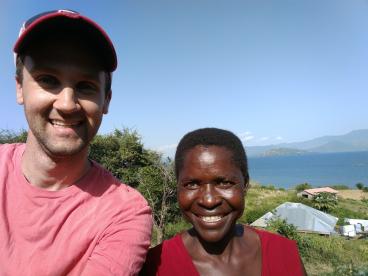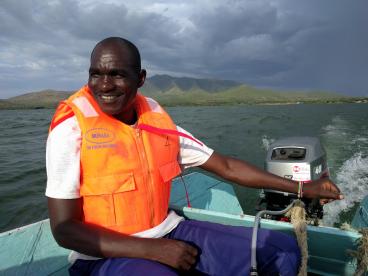Student Spotlight: Investigating How Health Navigation Improves Maternal Mortality on Mfangano Island
A woman is in labor and she and her baby are in distress; her midwife cannot manage the complications.
The nearest neonatal and obstetric care facility is hours away. The transport across Lake Victoria to the mainland takes about an hour, if a boat is even available, then it could take another one to two hours to reach an obstetrician and an operating room, which also may not be available, in a county of one million residents.
On Mfangano Island, eight thousand miles from Minnesota, in the middle of Lake Victoria, off the coast of Kenya, a University of Minnesota medical student is working with the Island’s residents to cut that travel time and to save peoples’ lives.
In July 2018, Nick DesLauriers arrived on the island as a Doris Duke International Clinical Research Fellow. He is working with Charles (Chas) Salmen, UMN Department of Family Medicine assistant professor, on a project funded by a UMN Center for Global Health and Social Responsibility (CGHSR) seed grant. The research team is studying whether the “Health Navigator” program, through which trained community health volunteers (CHVs)—first responders—in the village, can effectively coordinate and expedite emergency care transfers to the mainland. The project uses an emergency boat, available 24-hours a day, with a captain and a nurse.
Specifically, Nick is screening and analyzing the emergency cases that occurred across the island and surrounding islands. He is measuring delays and evaluating the factors that contributed to these delays.
There are eight health facilities on Mfangano Island and an additional facility on each of its three surrounding islands. But, Nick says, they lack the resources and operating rooms necessary to treat obstetrical and neonatal emergencies, which total approximately 100 per year on the four islands.
“Morbidity and mortality are currently very high on the island from these emergencies due to the remote location and very limited access to emergency and advanced obstetric services,” Nick says. “We hope to use this information to identify program changes that can shorten delays in care during emergencies, and thus reduce maternal and neonatal mortality.''
Twelve years ago, Nick’s mentor, Dr. Chas Salmen, initiated the collaboration on Mfangano and learned that health-related progress on the islands—and in any global health case—depends on establishing relationships, trust, collaboration, and deference to the culture and customs of the local people. Nick is experiencing this first hand, through his tenure on the islands, which will continue until May 2019.
“It's been such an important stepping stone to get the chance to spend an extended period of time to invest in understanding the research process and how this process is different in a global setting,” Nick says. “As one tasked with helping coordinate the study, I have to recognize the value in the skills and knowledge I bring to the table, but also be careful to not make too broad of assumptions that are unique to my experiences and background but are not as applicable here.”
Nick’s work is part of the MOMENTUM Study (Monitoring Maternal Emergency Navigation and Triage on Mfangano), a collaborative research effort between the University of Minnesota, local partners on Mfangano, and investigators at Maseno University in Kenya and Makerere University in Uganda. He works closely under the mentorship of Dr. Salmen as well as MOMENTUM Study CO-PI, Dr. Louisa Ndunyu, Chair of Maseno University Department of Public Health. Other members of the research team include Evance Ogala, an MPH candidate at Maseno, and Dr. John Ssenkusu, a biostatistician at Makerere University.
Implementing the study is building capacity of local investigators and creating long-term research partnerships. “As for the training, the treat was all mine,” says Dr. Ndunyu, who recently returned from Mfangano where she worked with Nick to plan a training for local research staff. “It was an exciting, adventurous experience being on the Island for the very first time. I enjoyed every little bit of it and the moments shared with everyone in the team. It is a great team.”
Nick says his research on the islands expands well beyond logistics and medical considerations. Being attuned to social, economic, political, and cultural dynamics helps foster the community’s engagement, which is crucial to the project’s success.
“I've learned how important it is for research projects in international settings to have community buy-in and support, as the research project needs to be seen as something that will benefit the community. If it's not seen that way, then it should be changed,” he says.
Mfangano Community Health Field Station
Learn more about the Mfangano Community Health Field Station @ the Ekialo Kiona (EK) Center.
Mfangano Community Health Field Station


